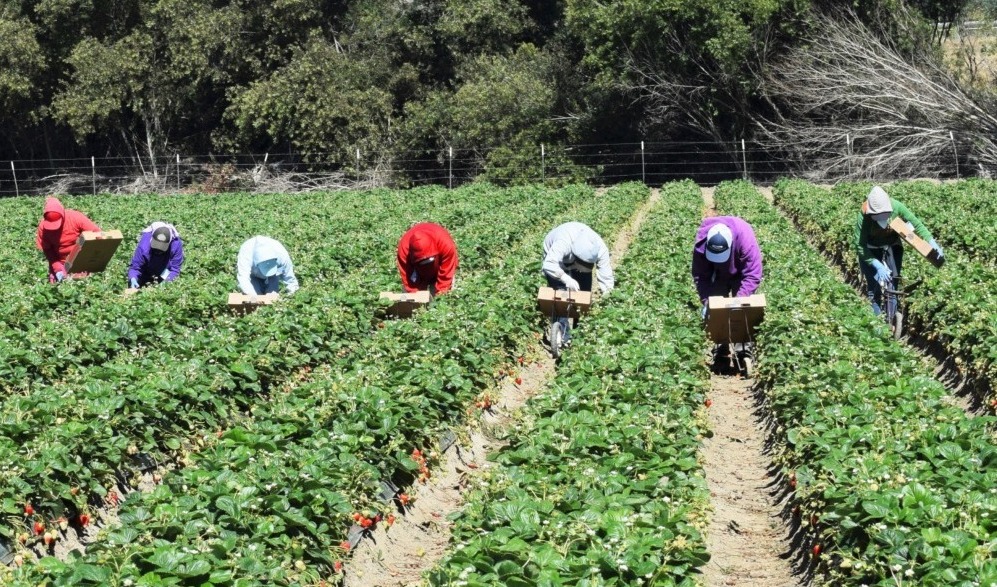Jose Velasquez, 20, was only eight years old when he got his first job picking blueberries on a farm outside of Goldsboro, North Carolina. He was tasked with helping his mother fill up buckets of berries, then running them up the row. There, a crew leader would give him a token for each bucket picked, which his family later redeemed for cash.

Courtesy of Jose Velasquez
Jose Velasquez, 20, began working on large farms when he was eight. Today, he is a college sophomore and recently interned with the National Migrant and Seasonal Head Start Association.
At age 13, Velasquez moved on to work in tobacco. He was young and limber and could pick quickly, but it was grueling. With dew weighing down the plants in the morning, walking beneath their arches to cut leaves in mid-summer was stifling. Hundred-degree days felt closer to 110.
“It was like an hour [per row of tobacco] of just being trapped in a hot box,” Velasquez said.
Some child workers wore black trash bags to protect themselves from pesticides and nicotine poisoning, which amplified the heat even more, he said.
“Every day was a bad day,” Velasquez said. Velasquez, who lacks legal residency in the U.S., was born in Mexico and raised in North Carolina. His mother is from Guatemala.
Hundreds of thousands of children like Velasquez work in agriculture across the U.S.
Under the Fair Labor Standards Act of 1938, the agriculture industry is exempt from adhering to most restrictions that govern child labor. The law is a New Deal-era policy with a racist legacy, intended to maintain systems in which Black workers and their families provided cheap labor in sharecropping-like arrangements.
Unlike other industries, where children may work certain jobs at age 14 with hourly restrictions, children as young as 12 can be hired on large farms for jobs like picking tobacco, with no limits on the hours they work outside of school and minimal safety protections.
It’s also legal for children of any age to work with the consent of their parent on small farms. But the current law’s ambiguity and weak protections are difficult to enforce, and children younger than 12 are commonly found working throughout the agricultural industry, advocates say.
The disparity in protections has serious ramifications. More children die while working in agriculture than in any other industry, according to the latest available Government Accountability Office report on the subject.
According to Human Rights Watch, the lack of legal protections is discriminatory under international law because child farmworkers in the U.S. are overwhelmingly Hispanic. Nearly half of farmworkers are immigrants who are unauthorized to work — a precarious status that means they receive no benefits, few if any protections and they are less likely to report abuse over fear of arrest and deportation. Even those who do have temporary work permits are dependent on their employer sponsors and vulnerable to exploitation.
Velasquez, who is now a sophomore at Tufts University in Massachusetts, said his family depended on the money he brought in. Working in tobacco enabled him to help purchase school supplies for himself and his three siblings, which he was proud to do.
But sometimes, when his mother was sick, Velasquez went to work alone. One week, after five full days spent picking tobacco, his boss told him that he hadn’t signed his name in the notebook where hours were kept, which meant no pay.
“It was scary to be put in a position where my work didn’t matter,” Velasquez said.
Youth agricultural workers exposed to stress and abuse
Sara Quandt, a professor of epidemiology and prevention at Wake Forest University School of Medicine, has studied the physical and psychological toll on children working in agriculture.
“You have to keep in mind that these are kids and so they don’t necessarily have the wherewithal to put up with an employer or a crew leader who might be bullying,” she said.
Quandt and her team have interviewed over 200 Latino child farmworkers since 2016.
Quandt found that sexual harassment and abuse of child farmworkers was common. Child workers also often reported seeing co-workers get injured or pass out due to heat stroke.
Related stories
• For youth activists, historic climate law is only the beginning
• Electrical workers union trains Chicago youth for growing solar market
• After a win for U.S. climate change education, classroom implementation is off to a slow start
• Youth find hope restoring Rio Grande wetlands threatened by climate change
• Youth and climate change: How a generation is adapting while fighting for their future
Outdoor workers are particularly vulnerable to heat-related illness, a risk that is increasing with rising temperatures caused by climate change. Children’s bodies dissipate heat less efficiently than adults, making them even more susceptible, Quandt added.
Because farmworkers are often paid a piece rate — 50 cents for a pound of blueberries, for example — families are incentivized to put children to work, and discouraged from taking breaks, even when temperatures soar, said Norma Flores López, a staff member at the East Coast Migrant Headstart Project and chair of the Domestic Issues Committee for the Child Labor Coalition.
Currently, there are no federal heat exposure protections for outdoor workers, although the Occupational Safety and Health Administration announced last year it was beginning the process of establishing new rules. In the meantime, only a few states, including California, Minnesota, Washington and Oregon, have passed their own protections.
López began working at age nine, traveling across the U.S. with her family to pick corn, asparagus and apples. She said in addition to the pressure placed on families by the piece rate system, farm operations can also use housing as leverage to maximize picking power.
“What happens is employers say, ‘I am providing housing for all of you as a family, so I need everybody of age to work out there,’” López said.
Farmworker parents often struggle to establish boundaries and deny their employers’ demands, as it’s not illegal for their children to work. That means elementary and middle school-age kids end up picking crops for hours on end after school, which they are legally required to attend, instead of focusing on homework, sports or play, she said.
The overall effect is trapping many Latino families, both documented and undocumented, in cycles of poverty, López said. Children struggle to juggle school and the physical demands of working unlimited hours, and are often pulled away from their studies. Farmworker youth drop out of school at four times the national average.
Uncertain future for proposed reforms
Former child farmworkers, including López and Velasquez, along with human rights researchers, have been advocating for legislation that would grant child farmworkers the same protections as other youth workers by amending the Fair Labor Standards Act.
Earlier this year, House Democrats introduced the CARE Act of 2022 that seeks to do just that. The bill would also increase civil penalties and introduce criminal penalties for employers who violate child labor provisions.
The bill’s chances of advancing are unclear, according to Margaret Wurth, a senior researcher with the Children’s Rights Division of Human Rights Watch who has been following the proposal closely.
She said a hearing in September appeared to attract the interest of lawmakers, but so far the bill has not made it to the floor for a vote. She expressed concern it may lose momentum with the loss of its lead sponsor, U.S. Rep. Lucille Roybal-Allard of California, the first Mexican-American woman elected to Congress, who is not running for reelection this year.
Opponents of the CARE Act, such as U.S. Rep. Fred Keller of Pennsylvania, argue that the bill could prevent opportunities for youth training in agricultural careers, despite the fact that it includes an exception for children of farm owners and those seeking vocational training.
“As a nation, we should be encouraging more young Americans to pursue a career in farming, not discouraging them,” he said during a subcommittee hearing on child agricultural labor in September. Keller, a Republican, is not running for reelection this year, but his concerns have been echoed by at least one other lawmaker from his party. No Republican has signaled support for the bill.
Wurth, who has interviewed hundreds of child farmworkers, said there is a “night and day” difference between the experience of mostly white young people working on their family farms and that of hired migrant child workers on what are often industrial-scale operations.
“This is a racist legacy that continues to have disproportionate harm on children of Hispanic origin and that [Congress has] a responsibility to do something about,” Wurth said.

Courtesy of Jose Velasquez
Gizela Gaspar, 20, started picking cherries at age five in the same basket she used to trick-or-treat. Today she is studying nursing.
Gizela Gaspar, 20, who recently interned with Velasquez at the National Migrant and Seasonal Head Start Association, started picking cherries at age five in the same basket she used to trick-or-treat.
Her family couldn’t afford daycare, and needed whatever extra money they could earn. So Gaspar has worked sweeping, sorting and packing fruits across Washington state for as long as she can remember. It’s kept her grounded, she said, and allowed her to support herself as she pursues a career in nursing at Heritage University in Toppenish, Washington.
But working in agriculture as a kid is not an experience Gaspar wishes upon any other young person. Recently, when her mother was poised to take her youngest sister into the fields, Gaspar put her foot down.
“I said ‘No, not if I have any say in it,’” she recalled.
Gaspar took the night shift at a warehouse so she could care for her sister during the day when her mom was at work. But she said it shouldn’t be up to individuals like her to protect farmworking youth.
“As much as I understood why my parents did what they did, I really wish someone could have advocated for me the way I did for my little sister,” Gaspar said.
***
Leanna First-Arai is an educator and freelance journalist who covers climate and environmental justice.






























